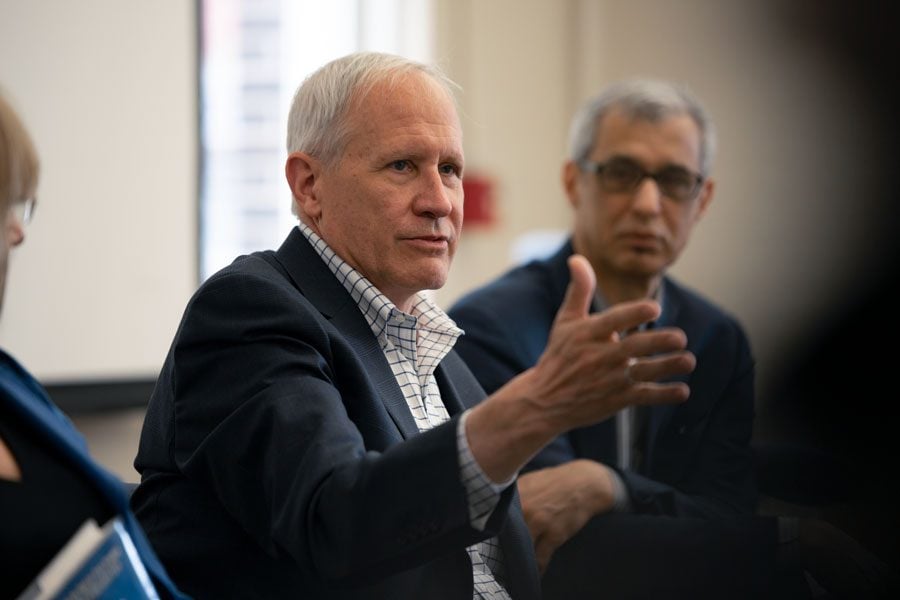David McCraw discusses new book about his role as New York Times legal counsel
Evan Robinson-Johnson / Daily Senior Staffer
David McCraw speaks at the McCormick Foundation Center. The deputy general counsel of the New York Times discussed his new book “Truth in Our Times”.
April 3, 2019
Recently, the Justice Department accidentally gave the New York Times a confidential document and tried asking for it back multiple times. In the end, the Times never returned it and published an article regarding its contents, prompting several lawsuit threats against the publication.
This is just one of the stories David McCraw — one of the people who would have defended the Times against the DOJ — discussed when he spoke on Wednesday at Fisk Hall about being a member of the legal counsel for the national paper.
McCraw talked to Northwestern students and faculty about his new book and the state of journalism in the Trump era and beyond. In his new book “Truth in Our Times,” David McCraw, the deputy general counsel of the New York Times, wrote about his experience in the legal proceedings that occupied the Times during the months before and after President Trump’s inauguration.
Salma Barhoumeh, a Weinberg freshman, questioned McCraw’s decision to go ahead and clear the confidential document for publication.
“For him obviously, he’s allowed to publish it,” Barhoumeh told The Daily. “But personally, I don’t think it’s really fair. It’s good that the people are more knowledgeable about what is going on in government, but it’s not necessarily fair. This document was classified for a reason, so that’s questionable in my mind.”
During his talk, McCraw emphasized the hectic and even threatening environment reporters are in today. At the New York Times, McCraw acts as a crisis manager, and helped to bring home reporters who were imprisoned overseas. He said the current administration’s “fake news” rhetoric emboldened the regimes that have historically placed restrictions on the media.
“The evil genius behind this sloganeering about fake news is that it sounds like somebody is in pursuit of the truth when it’s just the opposite.” McCraw said. “Fake news sounds like something somebody would say when they hear about the truth, but in fact, fake news is really an invitation to label and disregard and to not think.”
The true danger to a free press, McCraw said, is not concentrated in one political party but rather rested among those who are in positions of power. While the Trump administration has vocally labeled the New York Times as “failing” and threatened to sue multiple times, McCraw said even under Democratic presidents like President Barack Obama, the Times found itself in court trying to protect confidential sources.
Weinberg freshman Ola Wicko said she agreed with McCraw’s point about the dangerous press environment, but placed the blame on partisan tensions.
“The free press is really important and the fact that the conservatives tend to not stress that enough is putting democracy in danger,” Wicko said.
McCraw came into the public sphere in Oct. 2016 after the New York Times published an article about two women who had accused then-candidate Donald Trump of sexual harassment. McCraw said the Trump campaign had threatened to sue the Times for libel if they did not take down the article, which prompted McCraw to write a letter in response to Trump’s lawyers.
“We did what the law allows: We published newsworthy information about a subject of deep public concern,” McCraw’s letter to the Trump campaign’s lawyers said. “If Mr. Trump disagrees, if he believes that American citizens had no right to hear what these women had to say and that the law of this country forces us and those who would dare to criticize him to stand silent or be punished, we welcome the opportunity to have a court set him straight.”
Email: [email protected]
Twitter: @awstinbenavides


